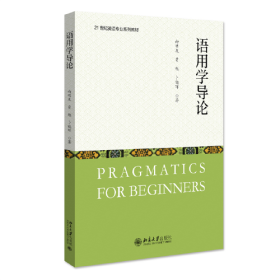
语用学导论 21世纪英语专业系列教材 向明友著
¥ 41.6 8.0折 ¥ 52 全新
库存5件
北京朝阳
认证卖家担保交易快速发货售后保障
作者向明友;贾勉;卜晓晖
出版社北京大学出版社
出版时间2022-08
版次1
装帧平装
上书时间2024-11-04
- 在售商品 暂无
- 平均发货时间 17小时
- 好评率 暂无
- 店主推荐
- 最新上架
商品详情
- 品相描述:全新
图书标准信息
- 作者 向明友;贾勉;卜晓晖
- 出版社 北京大学出版社
- 出版时间 2022-08
- 版次 1
- ISBN 9787301329351
- 定价 52.00元
- 装帧 平装
- 开本 16开
- 纸张 胶版纸
- 页数 180页
- 字数 377千字
- 【内容简介】
-
本书简洁英文,借生动实例,阐释艰深语用学议题,以期满足初学者学需求,培养其人文悟,提升其言语交际能力。全书由引言、指称语、预设、会话含义、言语行为、(不)礼貌、研究方法等七章正文和两个附录组成。每章包含核心概念导入、经典及前沿理论概述、理论嬗变阐释、个案剖析及章节要点回顾等要件。本书缘起本科生试改革,从期末课程作业起步,由教授与两位本科生合作完成,堪称以促学、科教融合的成功案例。
- 【作者简介】
-
向明友对外经济贸易大学教授、博士生导师,人才,兼任社科、人文社科评审专家,留学委评审专家,中国语言教育研究会副会长,语研究会ep专业委员会常务理事,中国语用学研究会理事。 - 【目录】
-
chapter 1 introduction
1.1 definitions of pragmatics
1.2 meaning and context
1.3 development of pragmatics
1.4 organization of the book
1.5 review
chapter 2 deis
2.1 preliminaries
2.2 deictic and nondeictic uses
2.3 types of deis
2.3.1 person deis
2.3.2 time deis
2.3.3 ce deis
2.3.4 so deis
2.3.5 discourse deis
2.4 applications: chinese vocatives as pragmatic markers
2.4.1 introduction
2.4.2 vocatives and coherence
2.4.3 vocatives and involvement
2.4.4 vocatives and (im)politeness
2.5 review
chapter 3 presupition
3.1 entailment
3.1.1 preliminaries
3.1.2 types of entailment
3.2 presupition
3.2.1 preliminaries
3.2.2 types of presupition
3.2.3 properties of presupition
3.2.4 presupition trigger
3.3 a parison between entailment and presupition
3.4 applications: entailment and presupition in real life
3.4.1 english writing
3.4.2 interpersonal munication
3.5 review
chapter 4 implicature
4.1 preliminaries
4.1.1 natural and non-natural meaning
4.1.2 implicature and implication
4.2 types of implicature
4.2.1 conversational and conventional implicatures
4.2.2 generalized and particularized conversational implicatures
4.2.3 scalar, alternate, and clausal implicatures
4.3 classical gricean theory
4.3.1 cooperative principle
4.3.2 creation of conversational implicature
4.3.3 criticisms of gricean theory
4.4 neogricean and tgricean theories
4.4.1 levinson’s q, i, and mprinciples
4.4.2 horn’s q and rprinciples
4.4.3 sperber & wilson’s principle of relevance
4.4.4 retrospections
4.5 properties of conversational implicature
4.6 applications: exploiting the four mams in friends
4.6.1 exploiting the mam of quantity
4.6.2 exploiting the mam of quality
4.6.3 exploiting the mam of relation
4.6.4 exploiting the mam of manner
4.7 review
chapter 5 speech acts
5.1 preliminaries
5.1.1 performativeconstative dichotomy
5.1.2 the performative hypothesis
5.2 austin’s theorizing of speech acts
5.2.1 felicity conditions on performatives
5.2.2 locutionary, illocutionary, and perlocutionary acts
5.2.3 types of illocutionary force
5.3 searle’s theorizing of speech acts
5.3.1 felicity conditions on speech acts
5.3.2 typology of speech acts
5.3.3 direct and indirect speech acts
5.4 recent developments in speech act theory
5.4.1 study of perlocution
5.4.2 classifications of speech acts
5.4.3 sequencing in speech acts
5.5 speech acts across cultures and contexts
5.5.1 crosscultural variations
5.5.2 intralanguage variations
5.6 applications: persuasion in chinese online forum requests
5.6.1 introduction
5.6.2 ethos: projecting self to the requestees
5.6.3 pathos: awakening the emotion of the requestees
5.6.4 logos: reasoning with the requestees
5.7 review
chapter 6 politeness and impoliteness
6.1 theorizing politeness
6.1.1 characterizing politeness
6.1.2 politeness as strategic face management
6.1.3 politeness as a conversational mam
6.1.4 politeness as situated evaluation
6.2 theorizing impoliteness
6.2.1 types of impoliteness
6.2.2 impoliteness as strategic face attacks
6.2.3 impoliteness as conversational mams
6.2.4 impoliteness as a discursive practice
6.3 some potential issues in (im)politeness research
6.4 applications: politeness in online forum requests
6.4.1 introduction
6.4.2 bald on record strategies
6.4.3 itive politeness strategies
6.4.4 politeness strategies
6.5 review
chapter 7 research methods
7.1 literature mining
7.1.1 four
点击展开
点击收起
— 没有更多了 —





















以下为对购买帮助不大的评价